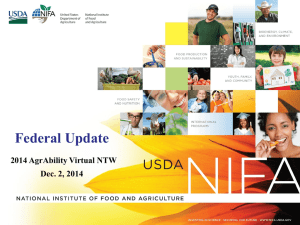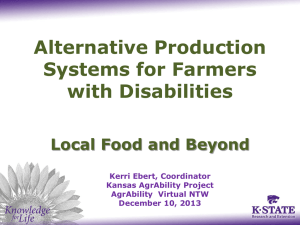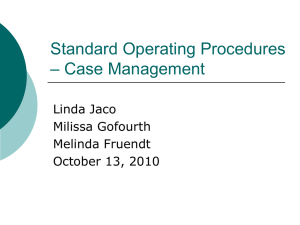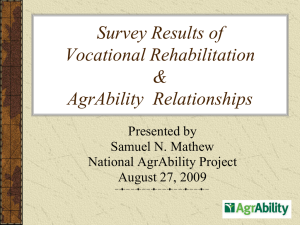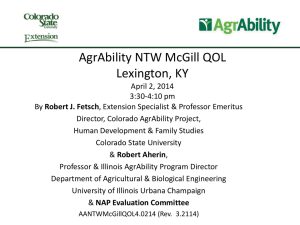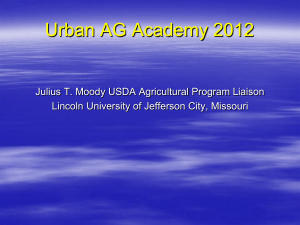Core Competency - National AgrAbility Project
advertisement
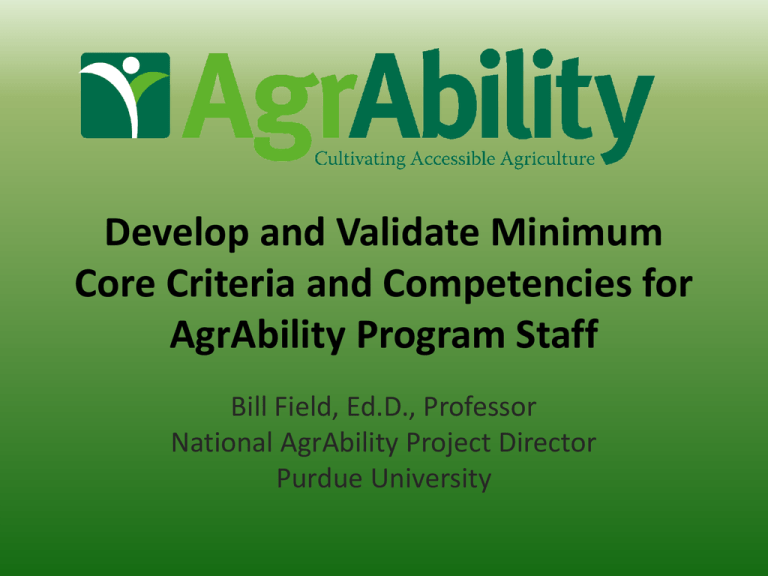
Develop and Validate Minimum Core Criteria and Competencies for AgrAbility Program Staff Bill Field, Ed.D., Professor National AgrAbility Project Director Purdue University Goal Develop, validate, and introduce a recommended set of minimum core criteria and competencies for professionals providing AgrAbility-related services to individuals under the current provisions of the USDA AgrAbility Program funding authorization. After 20 years, why the interest in identifying core criteria and competencies? • AgrAbility is maturing as a service delivery program • Increased institutional expectations for fiscal accountability and successful outcomes • Increased client expectations • Greater complexity of rehabilitation services • Greater emphasis on risk management • Concerns over professional liability • High rate of staff turnover • Other Anticipated Outcomes • • • • Increase likelihood of successful outcomes Improve productivity of AgrAbility staff Enhance cost effectiveness Contribute to development of professional standards • Aid in hiring of new and replacement staff • Provide guidance to developing outcome-based, continuing education opportunities (NTW) for AgrAbility staff • Other The process will begin with the AgrAbility mission: AgrAbility is a program sponsored by USDA that provides assistance to farmers, ranchers, other agricultural workers, and their family members affected by disability and who desire to be successful in agricultural-related employment. The process will include: • Relevant literature regarding professional criteria and competency identification will be reviewed • A preliminary list of minimum core criteria and competencies will be drafted • An expert panel will be used to review, refine, and validate the list (DACUM/Delphi Methods) • All current AgrAbility staff will be provided an opportunity for input • Process will be documented and findings published Minimum Criteria Minimum qualifications recommended for persons currently employed and pursuing employment to provide direct AgrAbility client services that meet the provisions of the USDA AgrAbility authorization language. For example, these minimum criteria could include: • Minimum age (21) • Minimum educational qualifications (B.S., M.S.) • Demonstrated mastery of the primary language of AgrAbility clientele being serviced • Valid driver’s license (ability to travel) • Submit to criminal background check • Three years of agricultural-related experience • Other Minimum Core Competencies The minimum core demonstrable knowledge, skills, behaviors, and attitudes that provide an individual the capacity to function or develop as a professional who can provide AgrAbility services consistent with the provisions of the AgrAbility authorization language. To the extent possible, minimum core competencies should be clearly stated in operational, measurable terms (Bloom). For example: The AgrAbility staff member should be able to: • • • • • • Recognize... List... Name... Describe... Explain... Analyze... Minimum core competencies could be categorized into related subsets of knowledge, skills, behaviors, and attitude. For example: • • • • • • • • • • AgrAbility Program-related knowledge Delivery of AgrAbility services Communications Record keeping and management Professional collaboration Current agricultural practices Assistive Technology Program management Program evaluation Other AgrAbility Program-Related Knowledge AgrAbility staff will have a thorough knowledge of the mission, goals, and objectives of the AgrAbility Program as defined by the USDA AgrAbility Program authorization language and the most current published requests for application (RFA). Staff should be able to: 1. Describe the source of AgrAbility funding and the agency that is charged with program management and oversight 2. Name the key contacts at the National AgrAbility Project and USDA/NIFA responsible for program management and oversight AgrAbility Program-Related Knowledge (continued) 3. Explain the scope and limitations of services 4. Describe the prevalence of the key forms of disability within the agricultural community 5. List the primary sources of AgrAbility-related information and resources and demonstrate how to access them Delivery of AgrAbility Services AgrAbility staff will apply recognized evidence-based knowledge and technology that is safe, compassionate, appropriate, and effective for enhancing the likelihood that AgrAbility clientele will achieve their personal and career goals, especially related to their success in agriculture. Staff should be able to: 1. Conduct a relevant and accurate assessment of an AgrAbility client’s needs and goals using a standard assessment process 2. Identify potential limitations that would hinder an AgrAbility client from reaching their personal and career goals, especially related to their success in agriculture Delivery of AgrAbility Services (continued) 3. Identify potential risks for secondary injury within the client’s living and working environment 4. Identify behavioral signs that indicated a need for referral to behavioral or mental health professionals 5. Identify signs and symptoms that indicate the need for referral to a healthcare professional Communication Skills AgrAbility staff will demonstrate a sufficient level of written and verbal communication skills that will allow for the effective delivery of relevant and evidence-based information to AgrAbility clients, collaborating professionals, and other stakeholders. Staff should be able to: 1. Communicate to clients in their primary language or recognize the need for an interpreter 2. Demonstrate the necessary writing skills to prepare needed reports, assessments, and communications 3. Present a verbal overview of AgrAbility services to an audience of stakeholders Record Keeping and Management AgrAbility staff will demonstrate a sufficient ability to maintain and manage AgrAbility client records to protect client confidentiality and meet their respective Institutional Review Board requirements. Staff should be able to: 1. Explain the importance of maintaining client confidentiality and protecting the professional/client relationship 2. Explain the requirements of the Institutional Review Board policies concerning client confidentiality and access to client records Record Keeping and Management (continued) 3. Explain the role of photo release forms and their role in maintaining client confidentiality, if requested 4. Explain why some healthcare providers and rehabilitation service providers are restricted from revealing certain client information Professional Collaboration AgrAbility staff will demonstrate an awareness of the need, in most cases, for a professional collaborative approach to providing services to AgrAbility clients and their families to ensure the greatest potential for successful outcomes. Staff should be able to: 1. List the key stakeholders in the delivery of appropriate rehabilitation services and the contributions that they can make to increasing the likelihood of successful outcomes. This includes VR, OTs, PTs, Tech Act Projects, and ATPs. Professional Collaboration (continued) 2. List the key resources available to assist in addressing agricultural-related issues that affect an AgrAbility client’s ability to reach their vocational goals, including Cooperative Extension, FSA, equipment dealers, and bankers 3. Describe the process of developing a collaborative individualized rehabilitation plan 4. Describe the professional liabilities that may limit the role that certain professionals can play in prescribing rehabilitation solutions Minimum core competencies identified through this effort: • Will be reviewed by all AgrAbility staff • Will not be mandatory • Will be recommended as a guide for staff selection and development • Will recognize the diversity of skill sets that current staff bring to the table • Will help shape the contents of the NTW • Will not be used to evaluate State and Regional AgrAbility Projects Questions

